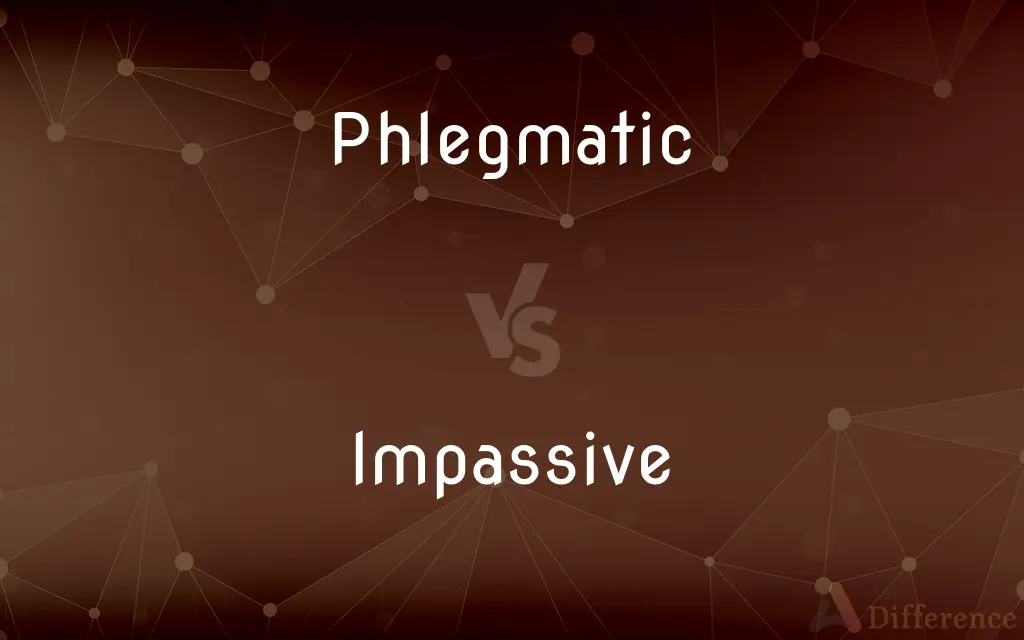Phlegmatic vs. Impassive — What's the Difference?
By Tayyaba Rehman & Maham Liaqat — Updated on March 29, 2024
Phlegmatic individuals display a calm, unemotional demeanor due to their temperament, while impassive people show no emotion, often intentionally, in various situations.

Difference Between Phlegmatic and Impassive
Table of Contents
ADVERTISEMENT
Key Differences
Phlegmatic personalities are characterized by their consistent calm, reliability, and composed nature, often appearing unflappable even in stressful situations. On the other hand, being impassive involves consciously or unconsciously suppressing emotional reactions, presenting an exterior that is unaffected by external events or internal feelings.
While the phlegmatic temperament is rooted in ancient humorism, attributing such characteristics to bodily fluids and believed to influence personality and health, impassiveness is not necessarily linked to inherent temperament. Instead, it can result from a variety of factors, including personal choice, cultural influences, or psychological conditions, making it a more situational and potentially adaptable trait.
Phlegmatic individuals are generally seen as good listeners and steady friends, often maintaining a level head in crises. This contrasts with impassive individuals who, while possibly perceived as calm, might also be viewed as detached or indifferent, making it harder to gauge their true feelings or level of engagement in relationships or tasks.
In terms of adaptability, a phlegmatic person’s calmness is part of their overall personality, making them naturally inclined to seek harmony and avoid conflict. In contrast, someone who is impassive might employ their lack of visible emotion as a strategy in specific scenarios, such as negotiations or competitive situations, where revealing emotions could be a disadvantage.
The societal perception of these traits can also differ; phlegmatic individuals are often appreciated for their dependable and comforting presence, whereas impassive people might be respected for their apparent control under pressure but criticized for seeming aloof or unapproachable.
ADVERTISEMENT
Comparison Chart
Origin
Ancient humorism, linked to bodily fluids
Various factors, including choice or conditioning
Nature
Temperament; inherent personality trait
Behavioral; can be situational or adaptive
Perception in Relationships
Seen as reliable and steady
May be viewed as detached or overly controlled
Adaptability
Personality-driven; seeks harmony
Situational; may adapt based on circumstances
Societal Perception
Appreciated for calmness and reliability
Respected for control, criticized for aloofness
Compare with Definitions
Phlegmatic
Naturally calm and unemotional by temperament.
Her phlegmatic response to the emergency helped everyone stay focused.
Impassive
Can result from personal choice or conditioning.
Years of professional poker played a role in his impassive demeanor.
Phlegmatic
Tends to be reliable and composed.
His phlegmatic demeanor makes him a trusted advisor.
Impassive
Employs lack of emotion strategically.
Impassive in negotiations, she never lets her opponents read her emotions.
Phlegmatic
Seeks harmony and avoids conflict.
Phlegmatic personalities are often the peacemakers in their social circles.
Impassive
Might be perceived as detached or indifferent.
His impassive approach sometimes hinders emotional connections.
Phlegmatic
Good listeners and steady friends.
Phlegmatic individuals are valued for their steadfast support and empathy.
Impassive
Respected for control under pressure.
Impassive leaders are admired for their ability to remain unfazed in crises.
Phlegmatic
Maintains a level head in crises.
Phlegmatic people are the calm in the storm, unshaken by chaos.
Impassive
Shows no emotion, often intentionally.
Her impassive face during the debate revealed nothing.
Phlegmatic
Of or relating to phlegm; phlegmy.
Impassive
Not feeling or showing emotion
His cold, impassive face
Phlegmatic
Having or suggesting a calm, sluggish temperament; unemotional or apathetic.
Impassive
Devoid of or not subject to emotion.
Phlegmatic
(Archaic) Having phlegm as the dominant humor in terms of medieval physiology.
Impassive
Revealing no emotion; expressionless.
Phlegmatic
Not easily excited to action or passion; calm; sluggish.
Impassive
(Archaic) Incapable of physical sensation.
Phlegmatic
(archaic) Abounding in phlegm.
Phlegmatic humors
A phlegmatic constitution
Impassive
Motionless; still.
Phlegmatic
Generating, causing, or full of phlegm.
Impassive
Having, or revealing, no emotion.
Phlegmatic
One who has a phlegmatic disposition.
Impassive
Still or motionless.
Phlegmatic
Watery.
Impassive
Not susceptible of pain or suffering; apathetic; impassible; unmoved.
Impassive as the marble in the quarry.
On the impassive ice the lightings play.
Phlegmatic
Abounding in phlegm; as, phlegmatic humors; a phlegmatic constitution.
Impassive
Having or revealing little emotion or sensibility; not easily aroused or excited;
Her impassive remoteness
He remained impassive, showing neither interest in nor concern for our plight
A silent stolid creature who took it all as a matter of course
Her face showed nothing but stolid indifference
Phlegmatic
Generating or causing phlegm.
Impassive
Deliberately impassive in manner;
Deadpan humor
His face remained expressionless as the verdict was read
Phlegmatic
Not easily excited to action or passion; cold; dull; sluggish; heavy; as, a phlegmatic person.
Phlegmatic
Showing little emotion;
A phlegmatic...and certainly undemonstrative man
Common Curiosities
What does it mean to be impassive?
Being impassive means displaying no emotion, often as a conscious or unconscious choice, in various situations.
What defines a phlegmatic personality?
A phlegmatic personality is characterized by a calm, unemotional demeanor, seen as a natural temperament trait.
Is being impassive a good trait in professional settings?
It can be advantageous in certain scenarios, such as negotiations, where showing too much emotion might be seen as a weakness.
How do phlegmatic individuals handle conflict?
They typically seek to avoid conflict, striving for harmony and understanding in their interactions.
Do phlegmatic people show emotion?
Yes, but their emotional expressions are often subdued and controlled due to their calm temperament.
How do others perceive impassive individuals?
They may be admired for their emotional control but also misunderstood as unfeeling or distant.
Can cultural background influence a person's tendency to be impassive?
Absolutely, as some cultures value emotional restraint more highly, encouraging an impassive demeanor.
How is the phlegmatic temperament viewed in modern psychology?
While ancient humorism is outdated, the term "phlegmatic" is still used colloquially to describe a calm and steady personality type.
What challenges do impassive people face in personal relationships?
They might struggle with forming deep emotional connections if others perceive them as cold or uninterested.
Can someone be both phlegmatic and impassive?
While they differ in origin and adaptability, an individual could exhibit both traits, being naturally calm but also choosing when to suppress emotions further.
Why might someone choose to be impassive?
Reasons can vary, including personal security, cultural norms, or professional advantage in hiding one's true feelings.
Are phlegmatic traits beneficial in leadership?
Yes, their calm and stable demeanor can be reassuring to others, promoting a balanced and thoughtful approach to leadership.
Can the trait of being impassive be changed?
Yes, with self-awareness and effort, individuals can learn to express their emotions more openly if they choose.
Is a phlegmatic individual always calm?
Generally, yes, but like anyone, they can experience a range of emotions, albeit less intensely or visibly.
How can someone with a phlegmatic temperament contribute to a team?
Their steady, reliable presence can help stabilize team dynamics, especially in stressful situations.
Share Your Discovery

Previous Comparison
Sufferer vs. Victim
Next Comparison
Sunset vs. SunfallAuthor Spotlight
Written by
Tayyaba RehmanTayyaba Rehman is a distinguished writer, currently serving as a primary contributor to askdifference.com. As a researcher in semantics and etymology, Tayyaba's passion for the complexity of languages and their distinctions has found a perfect home on the platform. Tayyaba delves into the intricacies of language, distinguishing between commonly confused words and phrases, thereby providing clarity for readers worldwide.
Co-written by
Maham Liaqat















































